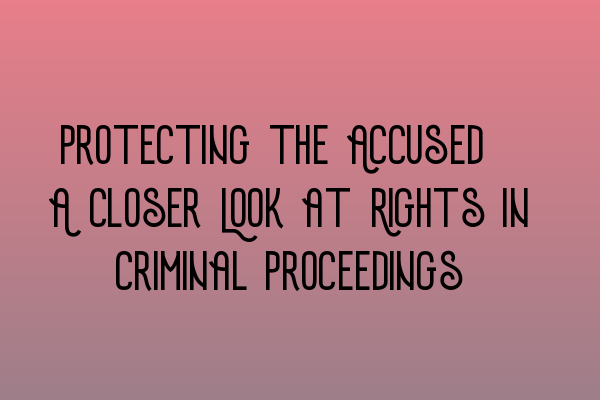Protecting the Accused: A Closer Look at Rights in Criminal Proceedings
Welcome to the SQE Criminal Law & Practice Law UK blog, where we delve into the intricacies of criminal proceedings and shed light on the importance of protecting the accused.
The Presumption of Innocence
When it comes to criminal law, one of the fundamental principles is the presumption of innocence. This means that every person accused of a crime is considered innocent until proven guilty in a court of law. It serves as a crucial safeguard against wrongful convictions and ensures fairness in the justice system.
However, it’s essential to understand that being accused of a crime can be a distressing experience. That is why it is vital to have a competent and experienced criminal defense solicitor who understands your rights and can protect you throughout the legal process.
The Right to Legal Representation
One of the key rights granted to the accused is the right to legal representation. Legal advice is crucial in navigating the complex criminal justice system. It ensures that the accused understands their options, rights, and possible defenses.
If you or someone you know is facing criminal charges, obtaining competent legal representation is paramount. Our team at SQE Criminal Law & Practice Law UK specializes in criminal defense and can provide you with the necessary guidance and support.
Access to Evidence
In any criminal case, access to evidence is crucial for both the prosecution and the defense. The accused has the right to examine the evidence presented against them, allowing them to challenge the prosecution’s case and present their own evidence.
If you are interested in learning more about the different types of evidence commonly used in criminal proceedings, check out our article on SQE 1 Practice Exam Questions.
The Right to Remain Silent
Another vital right of the accused is the right to remain silent. This means that no one can force the accused to make a statement or provide self-incriminating evidence. It protects individuals from being compelled to testify against themselves.
If you want to understand more about the right to remain silent and its implications, our article on SQE 1 Practice Mocks FLK1 FLK2 provides comprehensive information on this topic.
Fair Trial and Due Process
Every accused person is entitled to a fair trial and due process. This means that the legal proceedings must be conducted impartially, ensuring that the accused receives a fair opportunity to present their case and challenge the evidence against them.
If you are interested in learning more about the principles of fair trial and due process, we recommend exploring our article on SQE 2 Preparation Courses. It provides valuable insights into the procedures and safeguards involved in criminal proceedings.
Conclusion
Protecting the accused and ensuring their rights are respected is of utmost importance in criminal proceedings. The presumption of innocence, the right to legal representation, access to evidence, the right to remain silent, and the principles of fair trial and due process serve as cornerstones to safeguard the rights of individuals accused of crimes.
If you or someone you know requires legal representation or further information on criminal law, feel free to reach out to us. At SQE Criminal Law & Practice Law UK, we are committed to providing expert legal advice and guidance to those in need.
For more information about the SRA SQE Exam Dates and preparation courses, please visit our website: SQE 1 Preparation Courses and SRA SQE Exam Dates.
